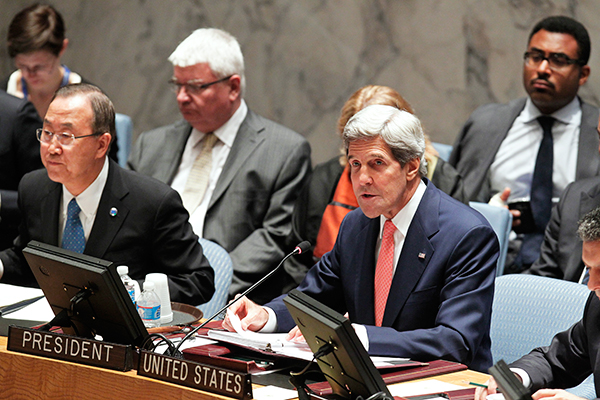
Download the full report here.
Following renewed fighting between the Congo’s national army, or FARDC, and the M23 rebel group, the U.N. Security Council will meet to debate the escalating conflict. Ahead of the meeting on July 25, the Enough Project released a report on the necessary diplomatic steps that should be taken by the U.N. Security Council, U.N. Special Envoy Mary Robinson, and U.S. Special Envoy Russ Feingold.
The report, “Four Steps for the U.S. and U.N. to Defuse Congo’s Escalating Crisis: Preventing Wilder Conflict,” addresses the primary causes of conflict in the region and the tensions that have hindered the peace process, citing the lack of agreement among signatories to the “11+4” Peace, Security, and Cooperation Framework and the scope of the U.N. Brigade’s offensive mandate and tactic. However, as the authors Sasha Lezhnev and Fidel Bafilemba point out:
“Despite the tensions, the 11+4 Framework remains an opportunity for all parties to have a fresh start at addressing root causes of the conflict. In Enough Project interviews with senior officials from Congo, Rwanda, and the region, all parties continue to express a desire to continue to work through the Framework as a means of dialogue.”
The report calls on the envoys to focus solutions outlined in the Framework including regional economic integration, security sector reform, and democratization. The authors also call on the U.N. Security Council to make economic integration an urgent action:
“(P)arties on all sides express a willingness to cooperate on cross-border economic projects, which they believe can present win-win scenarios and opportunities for working together.”
Economic stability is the strongest incentive for the countries to pursue peace. Methane gas, infrastructure, oil, minerals, and certification are all possibilities for cross-border investment and conflict-ending potential.
The report prescribes four steps that U.S. Envoy Russ Feingold and U.N. Envoy Mary Robinson can take to expedite peace:
- Clarify the role of the U.N. Brigade and addressing legitimate security interests; Specificially, addressing the key parties including MONUSCO, Congo, Rwanda, Tanzania, and South Africa.
- Help move Congo’s national consultations forward; U.N. Special Envoy Mary Robinson should step up and assist the Congolese government to resolve disagreements with the opposition on issues to be discussed in national consultations. Resolution should include more participation by the civil society and reforms that stick.
- Ensure follow-through from Kinshasa; U.S. Special Envoy Russ Feingold needs to impress on President Joseph Kabila the necessity of him to follow through on his commitments to reform. Not seeking a third presidential term and the prosecution of corrupt army generals violating human rights, like Gen. Gabriel Amisi, would be evidence of his commitment.
- Kick-start transparent regional economic integration; The report encourages the World Bank to, “prioritize the development of at least one regional economic integration project from the $1 billion pledged by Bank President Jim Yong Kim in May.”
If given the necessary priority, these diplomatic steps can be effective in preventing the peace process from becoming derailed and bringing an end to the cycle of conflict in the region.
Download the full report here.
Photo: John Kerry, United States Secretary of State and UN Secretary-General Ban Ki-moon (UN)

